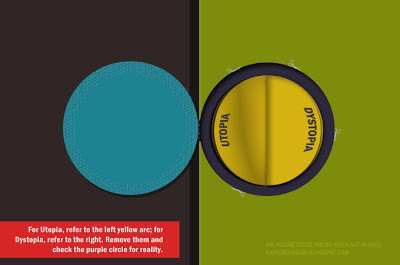On Utopia and Dystopia
The promised land of Utopia is almost similar to the pit of Dystopia, however they are divided by a fine line of our mental outlook
There is a catch here. The world is no light and bright as we wish it to be. Instead of being optimistic for its own sake, and without being hopelessly pessimistic, we can see the fine line between them that we can call it real, that we call it our reality. That’s it. Grapple with the reality. That’s actually what we are, that’s actually what the world really is. Being realistic also does not change the universal facts. We are how we make a balance between the good and the bad. The middle way is too tedious. This brings into question, in arts, the concepts of Utopia and its antithesis, Dystopia.
What are these concepts basically? Both of them are related to prediction and our perception of the future. Utopia is made of all good things and Dystopia is the opposite of all good things. In some scenarios for an effect, a bit of both is present in each creation, as is evident in certain literary works and motion pictures. These terms share an unlikely yet a common origin. Our vision and imagination to see the unforeseeable future is the foundation. If there is a yearning for an idealistic world, a Utopian society is the end in itself. A cynical perspective gives birth to the Dystopian world.
❝Utopia floats on the highlands of our dreams and desires; while Dystopia negates the lofty ideals, takes us down to earth and prompts us to see the ground reality where danger and warning are usually in the offing
Thanks to technology, nuclear warfare seems a global issue, though it involves only a handful of super power, super countries. Truth and facts are not the same thing, are they? Media and news tend to put them together but unwittingly most of the time we can see the stark differences.
 |
| Source: goodreads.com |
Idealism is the reason why we look forward to life. Otherwise we would have been killing or be killed, ironically for the survival. That’s a small price we have to pay for being an animal.
Far from being in a bout of Utopianistic episodes, our real world exists on a plain of chaos. Usually it dangles with the help of coercive forces like the state and the government or the fascists, when we take into consideration of our existence and the society as a whole. That’s why in an equally proportion to Utopia, the inevitable negative worldview creates the dialectic of Dystopia.
A closer look into Thomas Moore’s Utopia and George Orwell’s Nineteen Eighty-Four offers a big picture of our dreams and the mismatched reality, be it is of our hope or our despair. The duality is unsurprisingly inevitable. In some cases the features in the two dissimilar concepts are also interchangeable because of the same dual nature of our universe. Both of these above mentioned literary works have some overlapping features, yet when juxtaposed, there is a clear distinction between them.
 |
| Source: suite101.com |
In arts, the conclusion of a work determines the fictional but realistic facts: a Utopian pursuit might end with a Dystopian disaster or a Dystopian narrative would be completed with a Utopian dénouement. The universal dualities will cease to exist when we know the origin and the essence of our universe. Then we can have better judgmental power.
As long as we are stuck in this rut of mystery—either from our incompetence or the whims of the gods, as some people would love to believe—we should always weigh accurately the two sides of the existential coin. There is nothing good or bad as there is nothing so absolute. We are pitifully negligible compared to the vastness of the universe.
Many of us would love to be optimistic and happy as much as hopeful; but social reality can create in an individual the worst cynic. What is important is just how much we are clear about what we want. Take one: Utopia or Dystopia.
Concluded.


Comments
Post a Comment